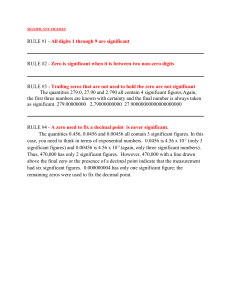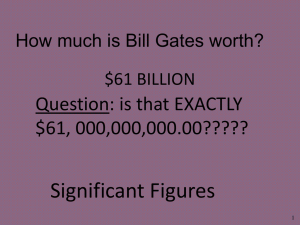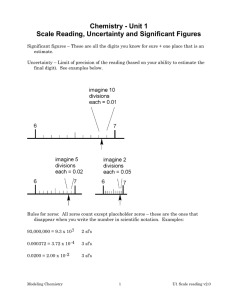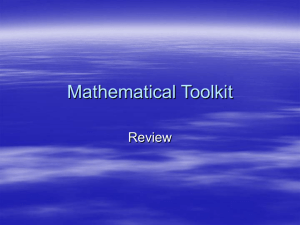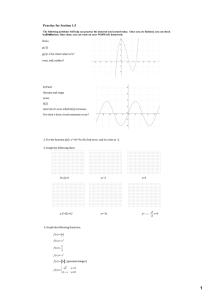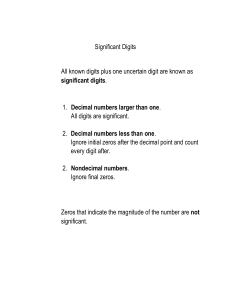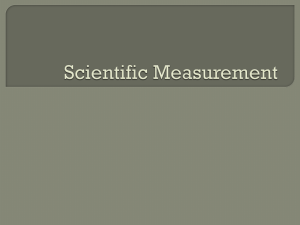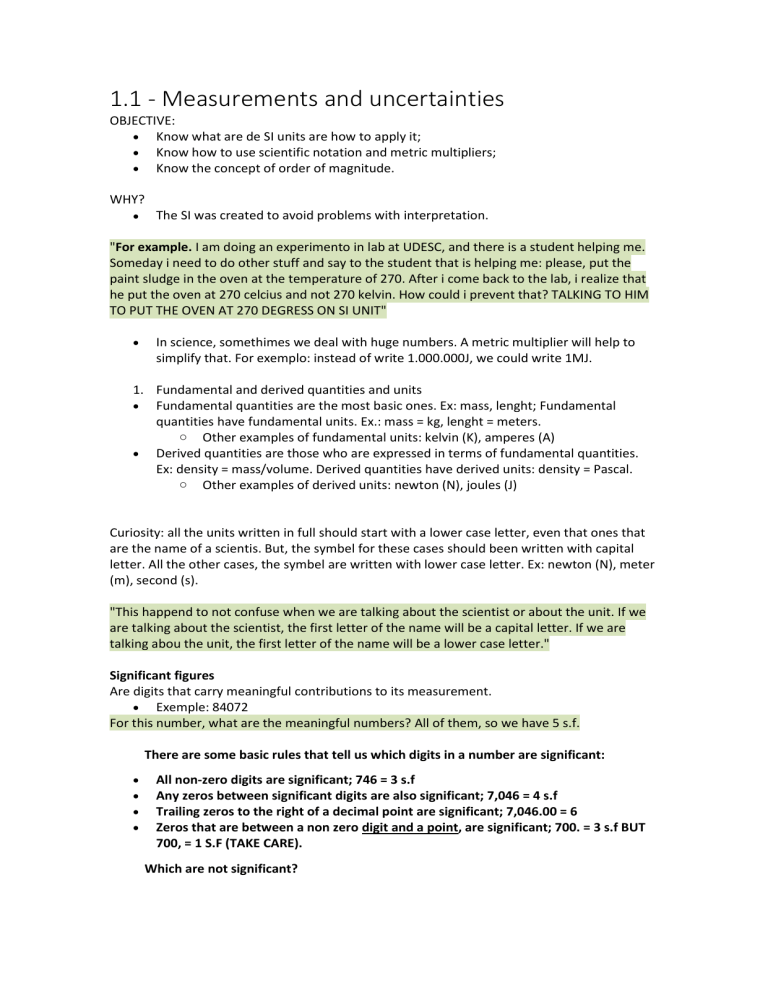
1.1 - Measurements and uncertainties OBJECTIVE: Know what are de SI units are how to apply it; Know how to use scientific notation and metric multipliers; Know the concept of order of magnitude. WHY? The SI was created to avoid problems with interpretation. "For example. I am doing an experimento in lab at UDESC, and there is a student helping me. Someday i need to do other stuff and say to the student that is helping me: please, put the paint sludge in the oven at the temperature of 270. After i come back to the lab, i realize that he put the oven at 270 celcius and not 270 kelvin. How could i prevent that? TALKING TO HIM TO PUT THE OVEN AT 270 DEGRESS ON SI UNIT" In science, somethimes we deal with huge numbers. A metric multiplier will help to simplify that. For exemplo: instead of write 1.000.000J, we could write 1MJ. 1. Fundamental and derived quantities and units Fundamental quantities are the most basic ones. Ex: mass, lenght; Fundamental quantities have fundamental units. Ex.: mass = kg, lenght = meters. o Other examples of fundamental units: kelvin (K), amperes (A) Derived quantities are those who are expressed in terms of fundamental quantities. Ex: density = mass/volume. Derived quantities have derived units: density = Pascal. o Other examples of derived units: newton (N), joules (J) Curiosity: all the units written in full should start with a lower case letter, even that ones that are the name of a scientis. But, the symbel for these cases should been written with capital letter. All the other cases, the symbel are written with lower case letter. Ex: newton (N), meter (m), second (s). "This happend to not confuse when we are talking about the scientist or about the unit. If we are talking about the scientist, the first letter of the name will be a capital letter. If we are talking abou the unit, the first letter of the name will be a lower case letter." Significant figures Are digits that carry meaningful contributions to its measurement. Exemple: 84072 For this number, what are the meaningful numbers? All of them, so we have 5 s.f. There are some basic rules that tell us which digits in a number are significant: All non-zero digits are significant; 746 = 3 s.f Any zeros between significant digits are also significant; 7,046 = 4 s.f Trailing zeros to the right of a decimal point are significant; 7,046.00 = 6 Zeros that are between a non zero digit and a point, are significant; 700. = 3 s.f BUT 700, = 1 S.F (TAKE CARE). Which are not significant? a. b. c. d. e. Trailing zero to the left of the decimanl point. Ex.: 3,200 = 2 s.f. TAKE CARE 3,200. = 4 s.f Zeros sandwiched between a decimal point and a number. Ex.: 0.004709 4 s.f. Only zeros after a comma are not significant. Ex.: 2298,00 = 4 s.f . TAKE CARE: 2298.00 = 6 s.f. Exercise: write down how many significant figures there are in each number below: 111 = 3 1101 = 4 01101,1 = 5 01101,10 = 6 0001101,100=7 Scientific notation The ways developed to deal with very large number or very small ones. Ex: the light speed is 299 792 458 m/s. It is a large number, isn't it? We can say that this is 2,99*10^8 m/s. The mass of an atom is 0,00000000000000000000000000000091 kg. Again, a very small number. How could we represent that in terms of scientific notation? 9,1*10^-31 kg. To work with scientific notation, there are some rules: 1. To work with sum or subtraction, the exponent must be the same or made to be the same; 2. If we multiply numbers, we add the exponent; 3. If we divide numbers we subtract the exponents; 4. If we will raise a number to a power, we raive the coefficient to the power and multiply the exponent by the power. Exercise: a. 3*10^5 + 3*10^7 = 3*10^5 + 300*10^5=303 *10^5 b. 3*10^5/3*10^7 = 3*10^5/300*10^5=3/300= 0,01 c. (3*10^5)^2 = 9*10^10 Orders of magnitude Are ways to simplify the written of a number. The most commom are: kilo = 10^3 = 1.000 mega =10^6 = 1.000.000 giga = 10^9 = 1.000.000.000 milli = 10^-3 = 0,001 Micro = 10^-6 = 0,000001 Nano = 10^-9 = 0,000000001 Estimation Estimation is a judgement of an approximate value.
